Meeting of the Lord
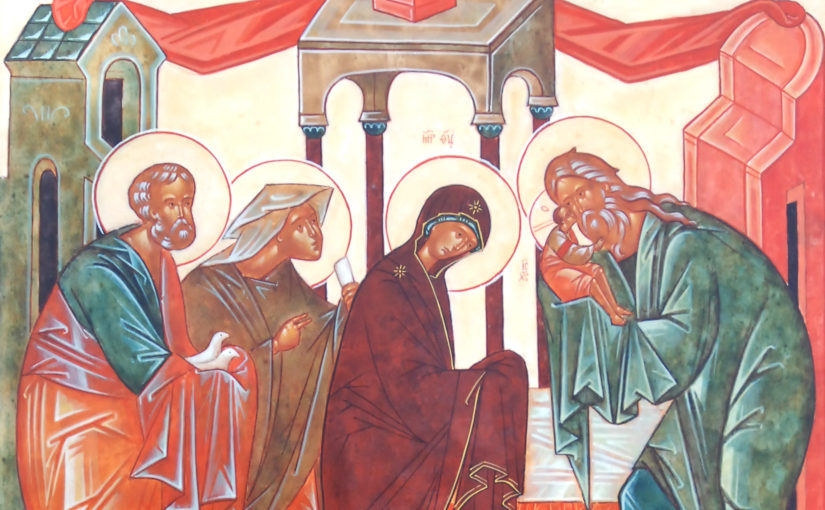 Forty days after Christ was born He was presented to God in the Jerusalem Temple according to the Mosaic Law. At this time as well His mother Mary underwent the ritual purification and offered the sacrifices as prescribed in the Law. Thus, forty days after Christmas, on the second of February, the Church celebrates the feast of the presentation called the Meeting (or Presentation or Reception) of the Lord.
Forty days after Christ was born He was presented to God in the Jerusalem Temple according to the Mosaic Law. At this time as well His mother Mary underwent the ritual purification and offered the sacrifices as prescribed in the Law. Thus, forty days after Christmas, on the second of February, the Church celebrates the feast of the presentation called the Meeting (or Presentation or Reception) of the Lord.
Synaxis of the Three Holy Hierarchs
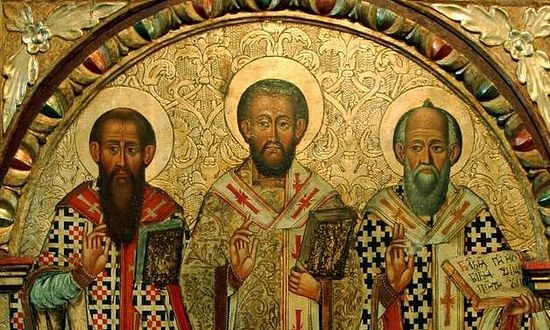 The Synaxis of the Three Holy Hierarchs: Basil the Great, Gregory the Theologian and John Chrysostom: During the eleventh century, disputes raged in Constantinople about which of the three hierarchs was the greatest. Some preferred St Basil (January 1), others honored St Gregory the Theologian (January 25), while a third group exalted St John Chrysostom (January 27 and November 13).
The Synaxis of the Three Holy Hierarchs: Basil the Great, Gregory the Theologian and John Chrysostom: During the eleventh century, disputes raged in Constantinople about which of the three hierarchs was the greatest. Some preferred St Basil (January 1), others honored St Gregory the Theologian (January 25), while a third group exalted St John Chrysostom (January 27 and November 13).
Venerable Parasceva (Petka) of Serbia
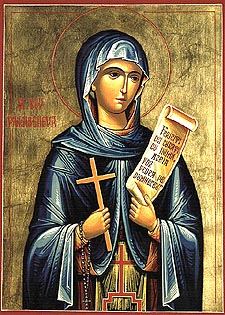 Saint Paraskeva the New was born into a pious family, living during the eleventh century in the village of Epivato, between Silistra and Constantinople. Her older brother Euthymius became a monk, and later he was consecrated as Bishop of Matidia. One day, while attending the divine services, the words of the Lord pierced her heart like an arrow, “If any man will come after Me, let him deny himself” (Mt. 16:24). From that time she began to distribute her clothing to the needy, for which reason she endured much grief from her family.
Saint Paraskeva the New was born into a pious family, living during the eleventh century in the village of Epivato, between Silistra and Constantinople. Her older brother Euthymius became a monk, and later he was consecrated as Bishop of Matidia. One day, while attending the divine services, the words of the Lord pierced her heart like an arrow, “If any man will come after Me, let him deny himself” (Mt. 16:24). From that time she began to distribute her clothing to the needy, for which reason she endured much grief from her family.
Upon the death of her parents, the saint was tonsured into monasticism at the age of fifteen. She withdrew to the Jordanian desert where she lived the ascetic life until she reached the age of twenty-five. An angel of the Lord ordered her to return to her homeland, so she stayed at Epivato for two years. Saint Paraskeva departed to the Lord at the age of twenty-seven, and was buried near the sea. Because of the many miracles which took place at her grave, her relics were uncovered and found to be incorrupt. They were placed in the church of the Holy Apostles at Epivato, where they remained for about 175 years. Saint Paraskeva’s relics were moved to Trnovo, Bulgaria in 1223 and placed in the cathedral. Patriarch Euthymius wrote her Life and established the day of her commemoration as October 14. The Turks occupied Bulgaria in 1391, and her relics were given to Mircea the Elder, Prince of the Romanian Land (one of the districts of Romania). In 1394 the relics were given to Princess Angelina of Serbia (July 30), who brought them to Belgrade.
Venerable John, Abbot of Rila
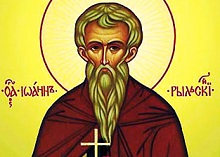 Saint John of Rila, the great spiritual ascetic of the Bulgarian Orthodox Church and Heavenly Protector of the Bulgarian nation, was born in the year 876 in the village of Skrino in the Sredets district [now Sofia].
Saint John of Rila, the great spiritual ascetic of the Bulgarian Orthodox Church and Heavenly Protector of the Bulgarian nation, was born in the year 876 in the village of Skrino in the Sredets district [now Sofia].
After he had been orphaned, the boy became a cowherd in order to avoid people. Once the rich man beat him for losing a cow with its calf. The boy cried long and he prayed, that God would help him. When he found the cow with the calf, the water at that time flowed high and strong in the River Struma. The young cowherd prayed, he placed his own tattered shirt on the water, made the Sign of the Cross over it, took up the calf in his arms and went with it, as though on dry land, to the other bank of the river where the cow was.
The Dormition of our Most Holy Lady the Mother of God and Ever-Virgin Mary
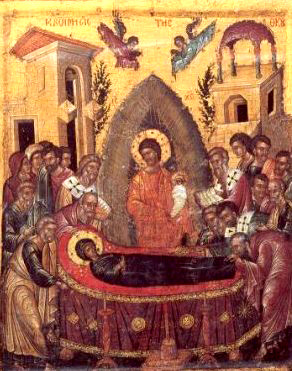 The Dormition of our Most Holy Lady Theotokos and Ever-Virgin Mary: After the Ascension of the Lord, the Mother of God remained in the care of the Apostle John the Theologian, and during his journeys She lived at the home of his parents, near the Mount of Olives. She was a source of consolation and edification both for the Apostles and for all the believers. Conversing with them, She told them about miraculous events: the Annunciation, the seedless and undefiled Conception of Christ born of Her, about His early childhood, and about His earthly life. Like the Apostles, She helped plant and strengthen the Christian Church by Her presence, Her discourse and Her prayers.
The Dormition of our Most Holy Lady Theotokos and Ever-Virgin Mary: After the Ascension of the Lord, the Mother of God remained in the care of the Apostle John the Theologian, and during his journeys She lived at the home of his parents, near the Mount of Olives. She was a source of consolation and edification both for the Apostles and for all the believers. Conversing with them, She told them about miraculous events: the Annunciation, the seedless and undefiled Conception of Christ born of Her, about His early childhood, and about His earthly life. Like the Apostles, She helped plant and strengthen the Christian Church by Her presence, Her discourse and Her prayers.

